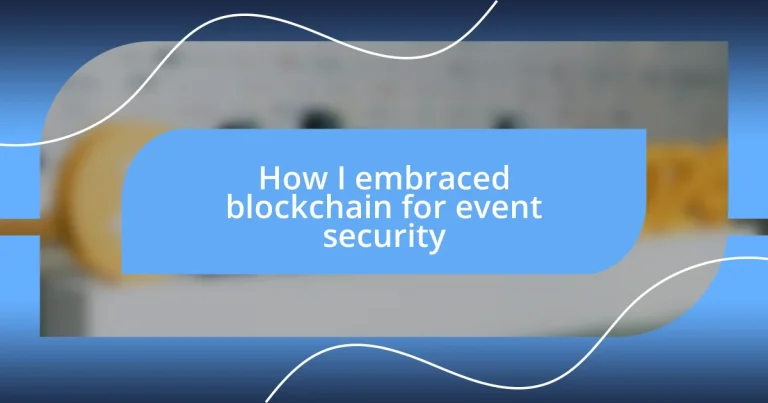Key takeaways:
- Blockchain technology serves as a decentralized ledger, enhancing security and transparency, which can revolutionize various industries, including event management.
- Effective event security is paramount for attendee safety and trust, with challenges in traditional systems such as fraudulent entries, poor coordination, and limited data tracking.
- Implementing blockchain can significantly improve event security through real-time verification, enhanced communication among security teams, and robust data protection for attendees.
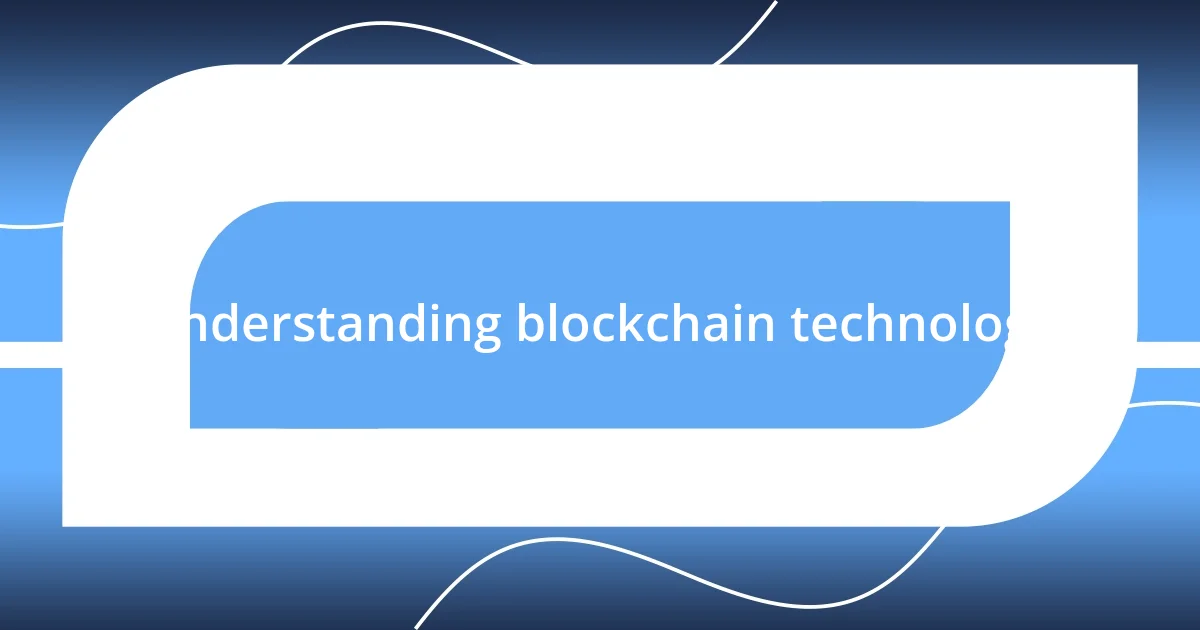
Understanding blockchain technology
At its core, blockchain technology is a decentralized digital ledger that records transactions across many computers in a way that ensures the data cannot be altered retroactively without the alteration of all subsequent blocks and the consensus of the network. This unique feature brings to mind a bank vault, where every transaction is meticulously logged, and each entry is a permanent record. Don’t you find it fascinating that this system not only enhances security but also fosters transparency?
I remember the first time I truly grasped the power of blockchain. I was attending a tech conference, and someone explained it using the analogy of a group of friends sharing an expense log. Everyone can see and verify the entries, and if someone tries to cheat, no one else will agree. This analogy hit home for me, as it made the concept feel so relatable. It was a lightbulb moment that deepened my appreciation for how blockchain can revolutionize trust in our digital age.
Moreover, the implications of blockchain extend far beyond cryptocurrency; it has the potential to reshape numerous industries. Just imagine a world where ticket sales for events are recorded on an immutable ledger. This could prevent counterfeiting and ensure that transactions are secure and transparent. Isn’t it exciting to think about how this technology can redefine security, not just for events but for everyday transactions?
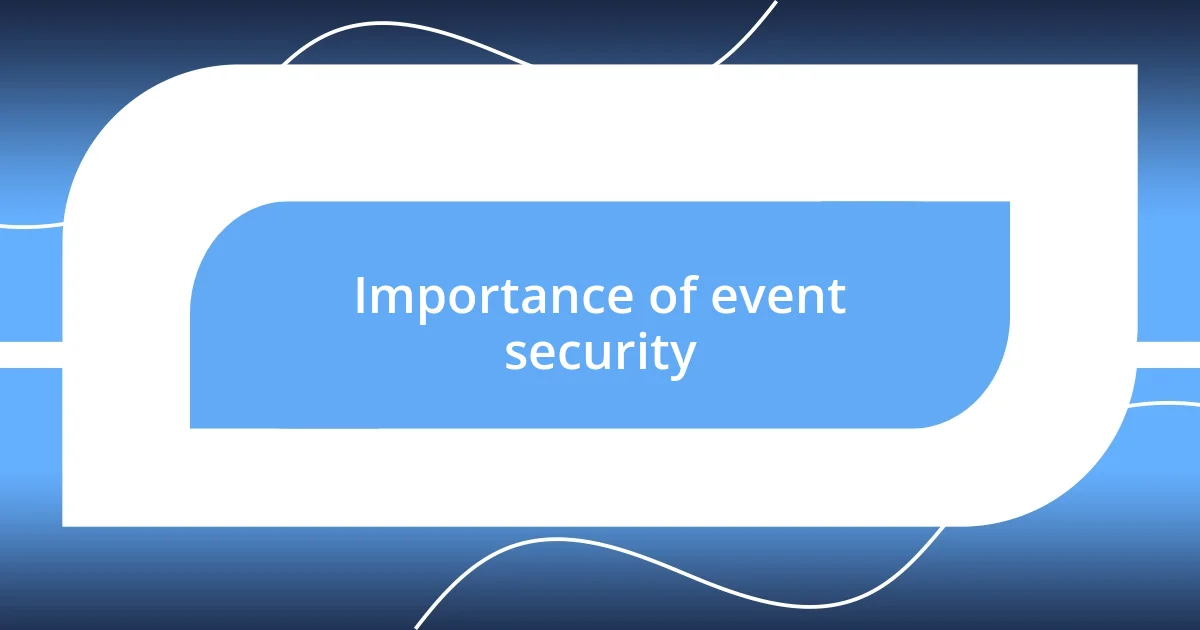
Importance of event security
When I reflect on the importance of event security, I can’t help but think of the sheer anxiety that can accompany planning any gathering. The safety of attendees is paramount, and with the rise of large-scale events, the stakes have never been higher. Whether it’s a concert or a corporate conference, protecting individuals not only builds trust but also ensures a positive experience.
- Secure environments deter criminal activities, fostering an atmosphere where every participant feels safe and valued.
- Effective security measures prevent unauthorized entry, ensuring that only legitimate attendees can access the event.
- Event reputation hinges on security; a breach can lead to lasting damage to brand trust.
- Attendee data protection is critical to maintain privacy and nurture relationships with future clients.
- A well-managed security plan can mitigate risks, ensuring that contingencies are in place for emergencies.
During my volunteer days with local festivals, I witnessed firsthand how security lapses could spoil even the best-planned events. I remember a situation where a simple miscommunication led to chaos at an entry point. It was eye-opening; a few minutes of disorganization spiraled into a situation that required quick thinking and robust security measures to regain control. This experience not only taught me the significance of thorough planning but also sparked my interest in advanced solutions like blockchain, where enhanced security can seamlessly integrate into event management processes.
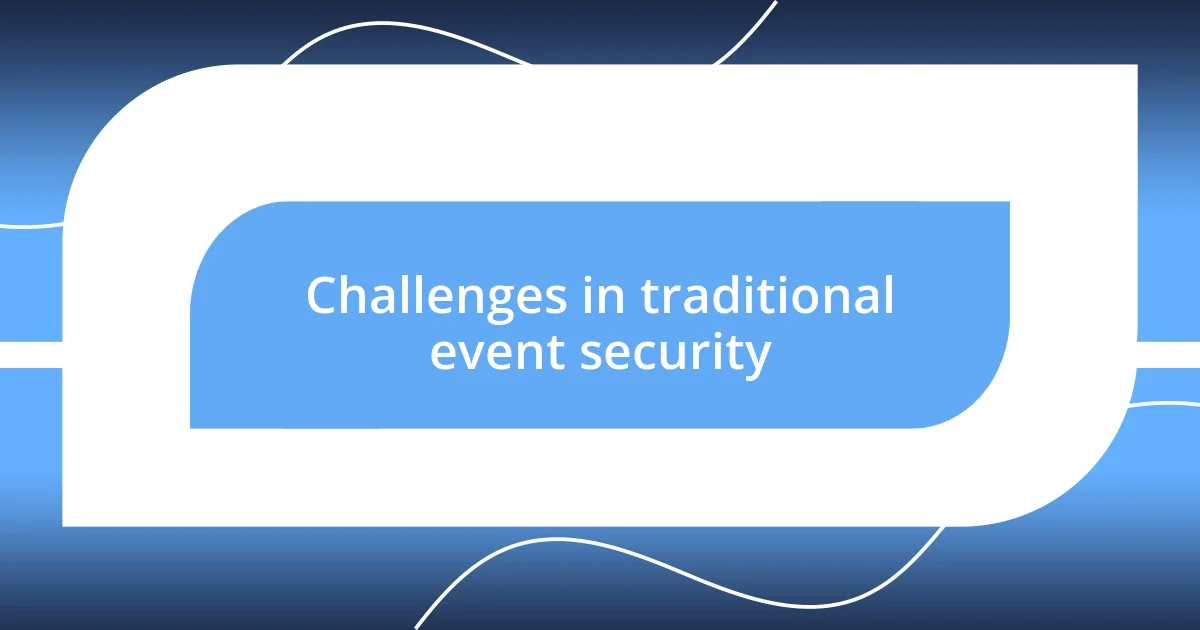
Challenges in traditional event security
The landscape of traditional event security is fraught with challenges that can undermine the safety and experience of attendees. For instance, manual ticketing processes often lead to fraudulent entries, where individuals misrepresent themselves to gain unauthorized access. I remember being at a crowded concert, feeling uneasy about how easily someone could slip through without a proper identity check. Such vulnerabilities can create chaos and diminish trust, leaving both organizers and attendees on edge.
Moreover, the coordination between various security personnel can often lack cohesion. During a regional fair I attended, the security team seemed overwhelmed and scattered, which impacted how effectively they managed the crowd. If communication falters, even the best-intentioned security measures can falter, leading to dangerous situations. The potential for misunderstandings highlights a critical gap in how traditional systems are set up.
Another significant challenge is the lack of real-time data tracking during events. I remember feeling anxious waiting for updates during an emergency evacuation drill; the delay in information was palpable. Limited visibility into incidents can turn manageable situations into crises. It’s evident that enhancing transparency and responsiveness is essential for creating safer environments at events.
| Challenges | Description |
|---|---|
| Fraudulent Entries | Unauthorized access via manual ticketing increases security risks. |
| Lack of Coordination | Poor communication among security personnel can lead to critical oversights. |
| Limited Data Tracking | Delayed information can escalate incidents into crises. |
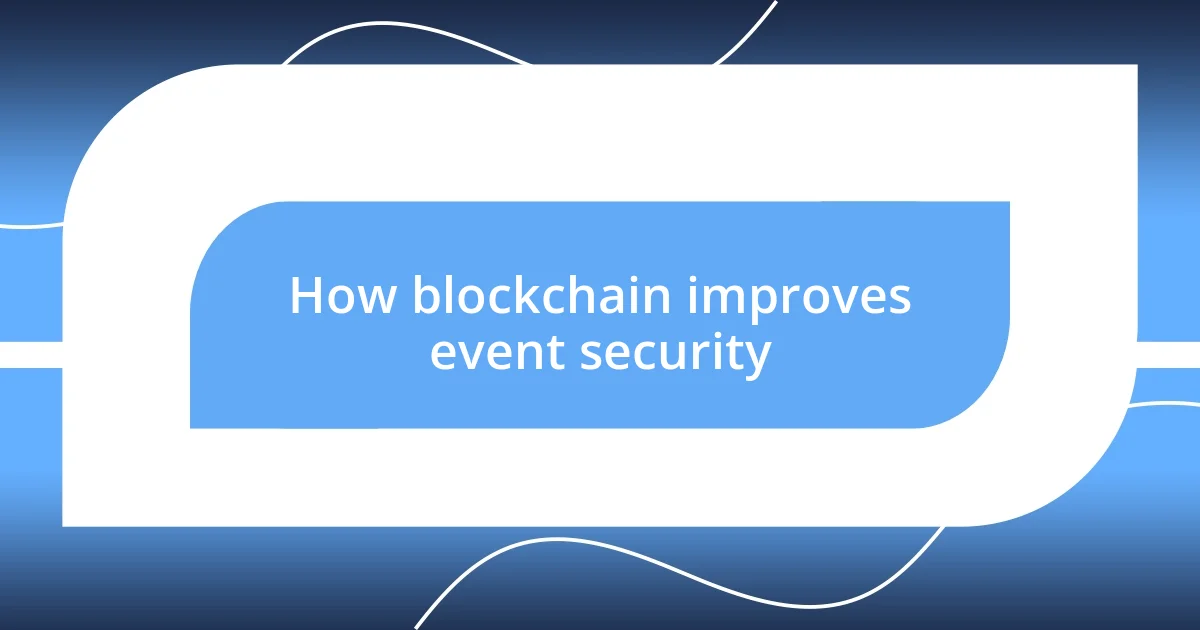
How blockchain improves event security
Embracing blockchain technology can significantly elevate event security by ensuring a secure and transparent process. Imagine attending an event where every ticket is verified through an immutable ledger – this not only prevents duplicate entries but also creates a chain of accountability. I’ll never forget the anxiety I felt waiting in line, unsure if my ticket was the real deal. Blockchain eliminates that worry, as each attendee’s entry is recorded and can be easily verified.
Moreover, the decentralized nature of blockchain enhances communication among security teams. I recall a moment at a large festival where mixed signals among security staff led to a concerning rise in tension. If we had a blockchain-based system, those inevitable miscommunications would be minimized, allowing for a seamless flow of information. What if every security personnel had real-time access to updates? The peace of mind that could bring to both event organizers and attendees would be invaluable.
Additionally, blockchain’s ability to protect attendee data is a game changer. With my past experiences in events, I can’t stress enough how crucial it is to preserve personal information. Each time my data was requested, I wondered if it was truly secure. Blockchain ensures that sensitive information remains encrypted and accessible only to authorized personnel, which not only fosters trust but also cultivates a welcoming environment. How empowering would it feel to attend an event knowing your privacy is being actively safeguarded?

Implementing blockchain solutions
Implementing blockchain solutions in event security requires both thoughtful planning and practical execution. From my experience, the first step is selecting a reliable blockchain platform that supports the specific needs of the event. I remember working with a platform that allowed us to create unique, non-fungible tokens (NFTs) for tickets. This not only detached tickets from the potential for duplication but also gave attendees a sense of ownership that traditional methods simply cannot replicate.
A crucial aspect I found was integrating smart contracts within the system. These automated agreements facilitate real-time access to entry verification and can trigger notifications to security personnel about potential fraudulent activities. During a music festival I attended, I noticed how swift transactions could enhance security; hinting at a future where delays would be virtually nonexistent. Wouldn’t it be reassuring to know that a simple code could prevent a crisis before it starts?
Finally, communication with stakeholders is essential. Regular updates and training sessions help security teams familiarize themselves with the blockchain system and its functionalities. When I participated in a workshop about blockchain security solutions, it struck me how much confidence a cohesive team could inspire. As we discussed practical scenarios, I felt an eagerness to share this knowledge with other event organizers, understanding that informed teams directly translate to safer experiences for all involved.
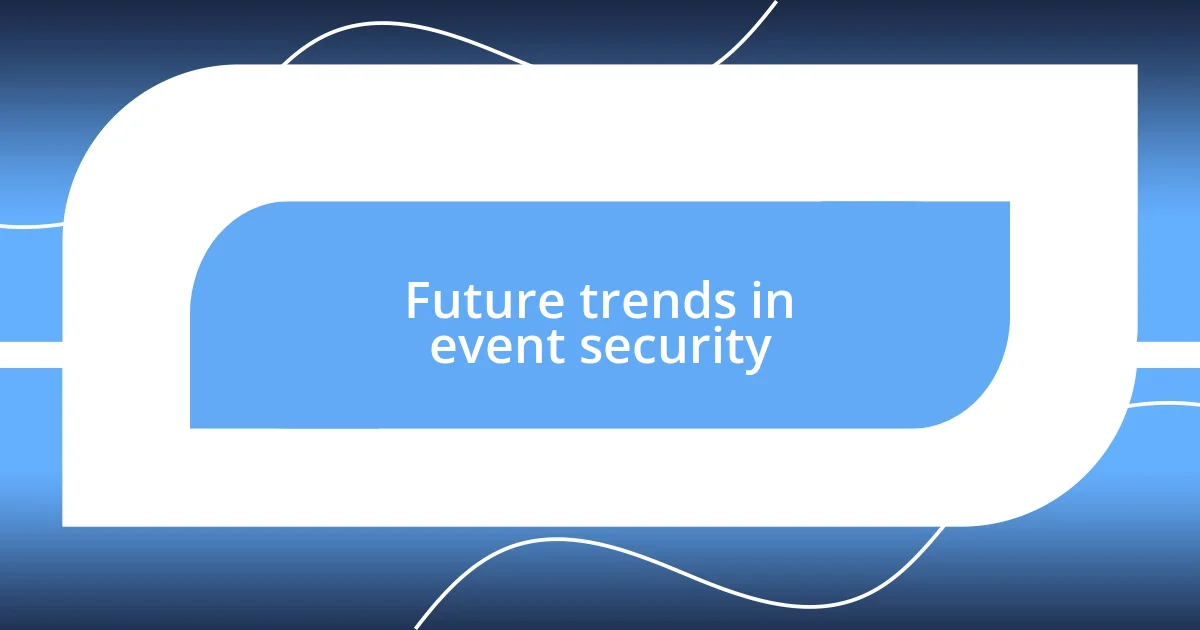
Future trends in event security
When I think about the future of event security, I see a landscape that is increasingly driven by technology and data analytics. Imagine a scenario where AI algorithms predict potential security threats before they escalate. I attended an event once where security responded to an incident in mere moments, thanks to real-time data analysis. It made me wonder—how much more effective could we be if predictive tools were integrated into our security framework?
One of the most promising trends I anticipate is greater collaboration between different stakeholders in the event space. When organizing an event, I’ve often felt the pressure of fragmented communication lines among teams. Now, envision a platform where vendors, security personnel, and even the audience can communicate seamlessly in real time. Wouldn’t that foster a sense of unity and shared responsibility? It excites me to think about how blockchain can create that interconnected environment, enhancing everyone’s experience.
Data privacy will continue to take center stage as events become more digitized. Reflecting on past experiences, I have felt uneasy sharing my information for ticket sales. It’s comforting to realize that with advancements in blockchain, mechanisms like zero-knowledge proofs could allow for secure verification without revealing sensitive details. Can you imagine attending an event where your personal data is safeguarded, and you’re the one in control? That’s the kind of future I look forward to, where trust is built directly into the fabric of event security.












